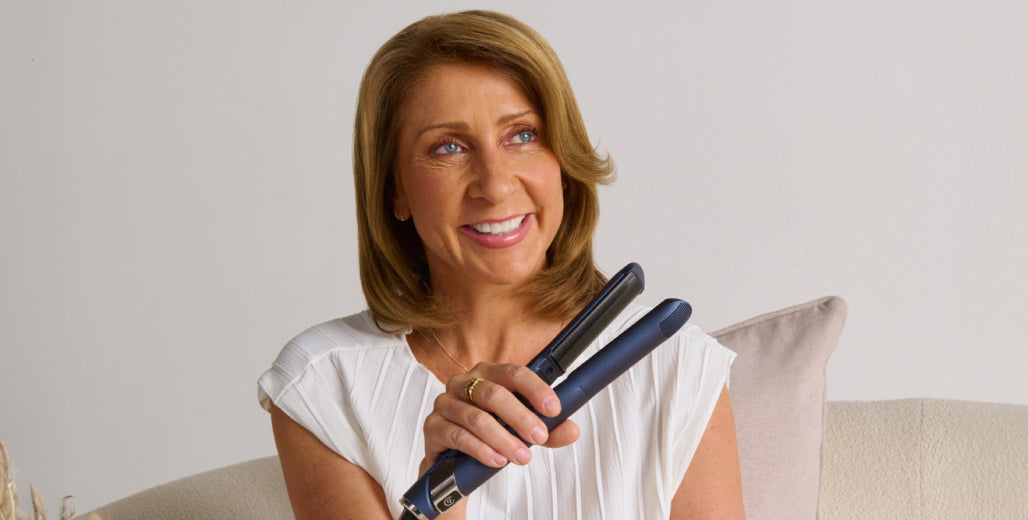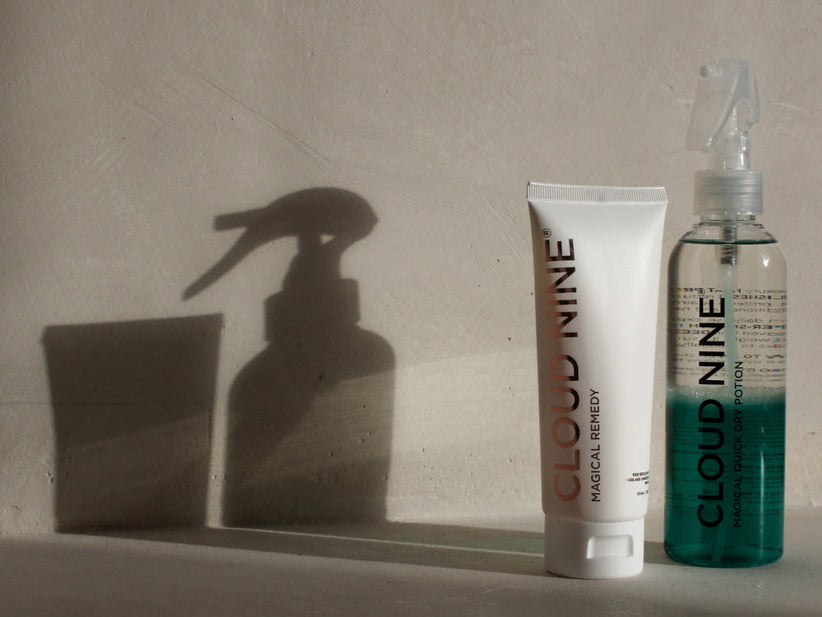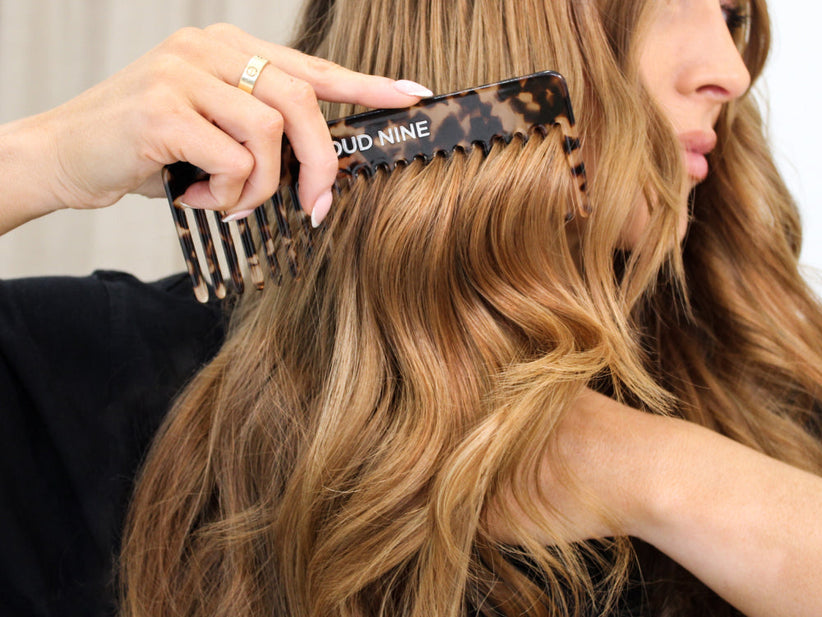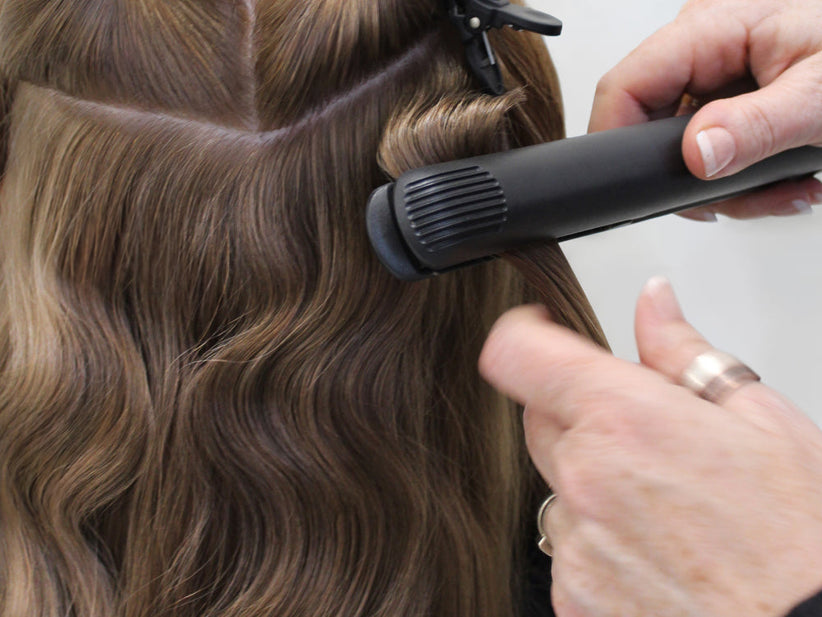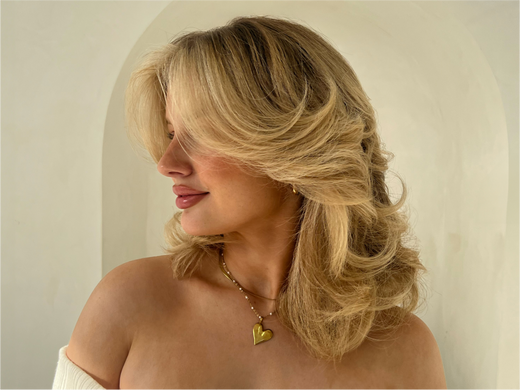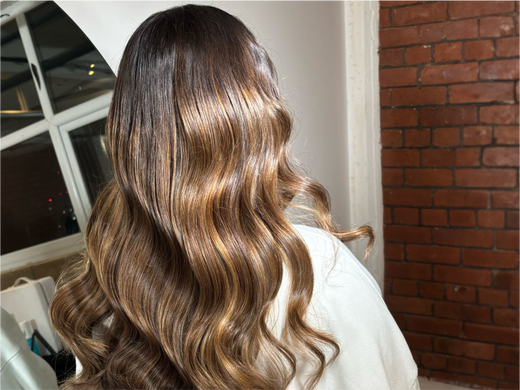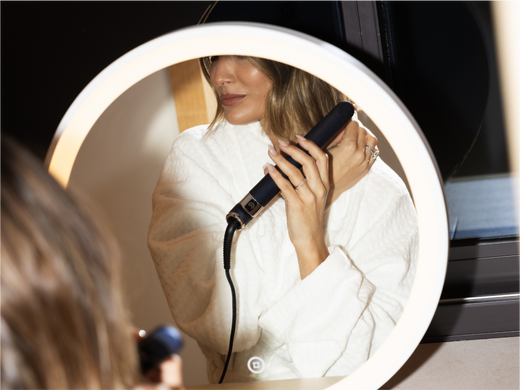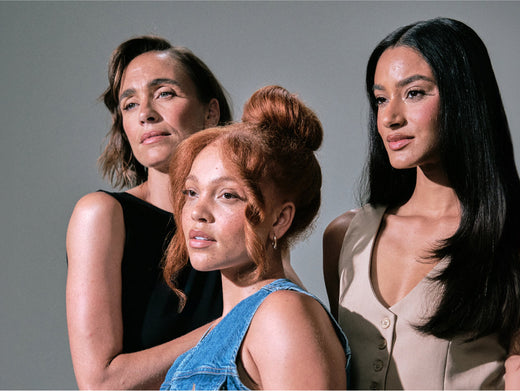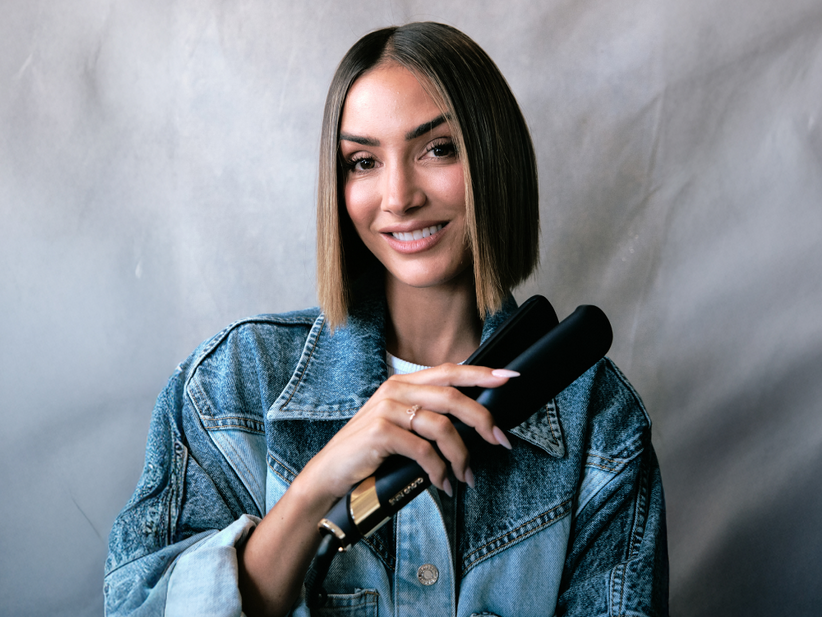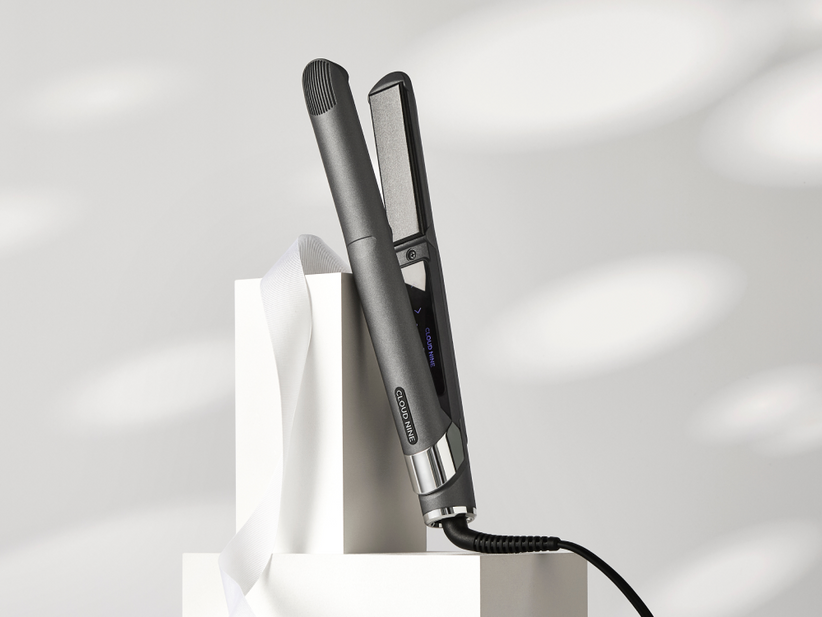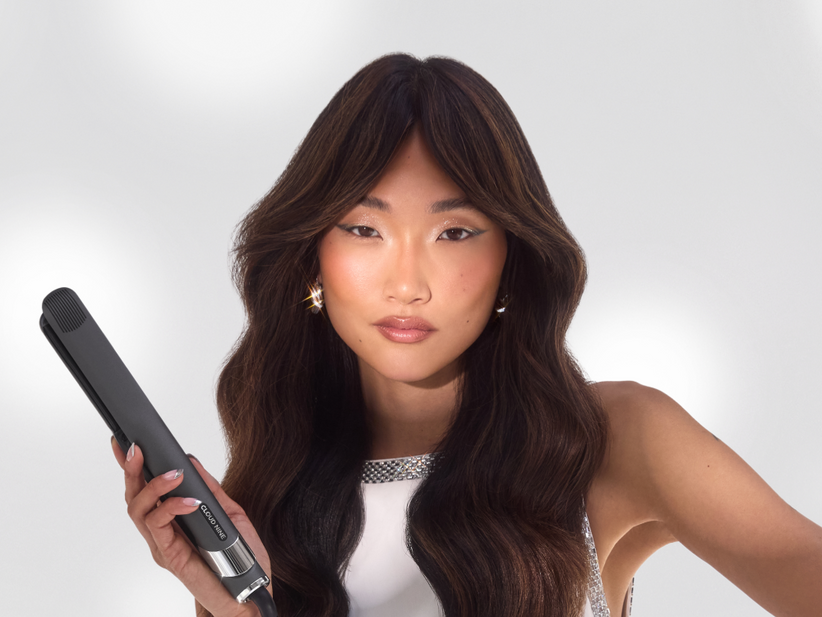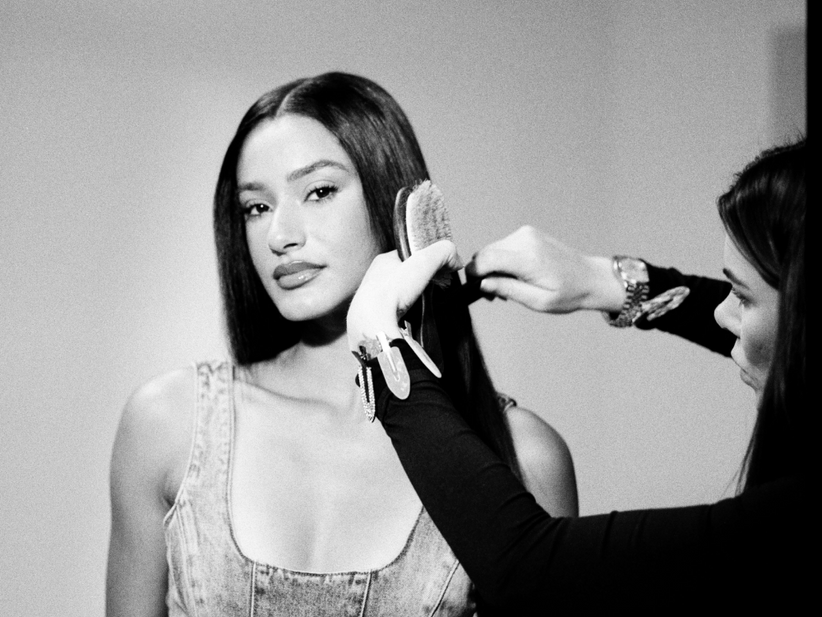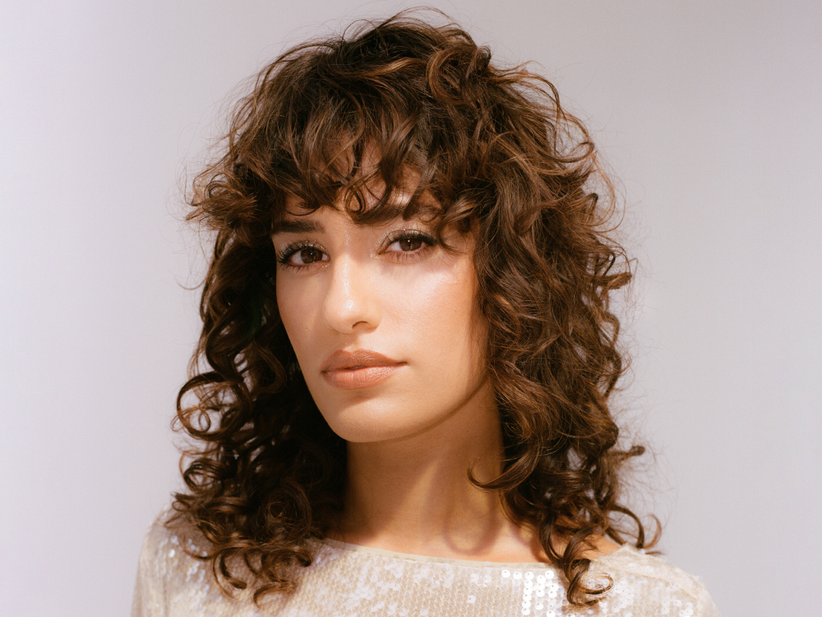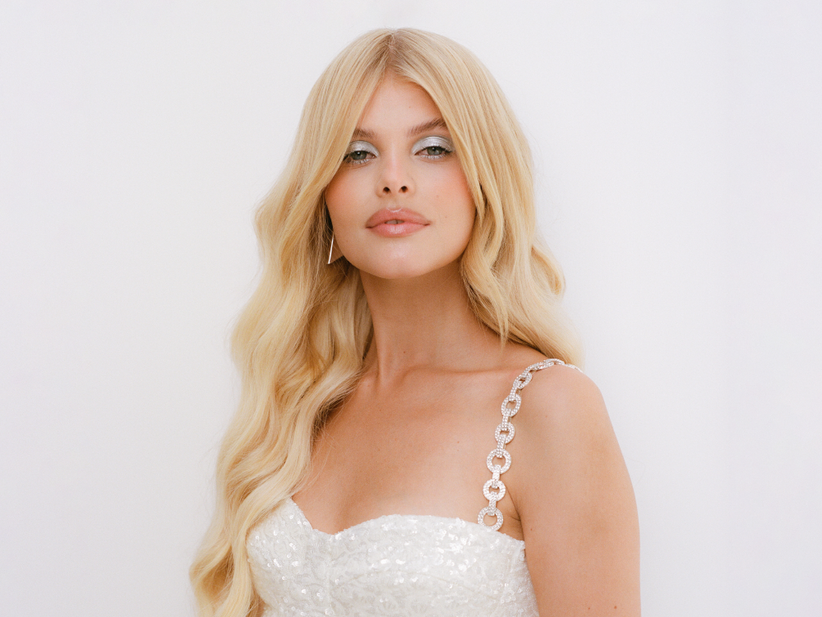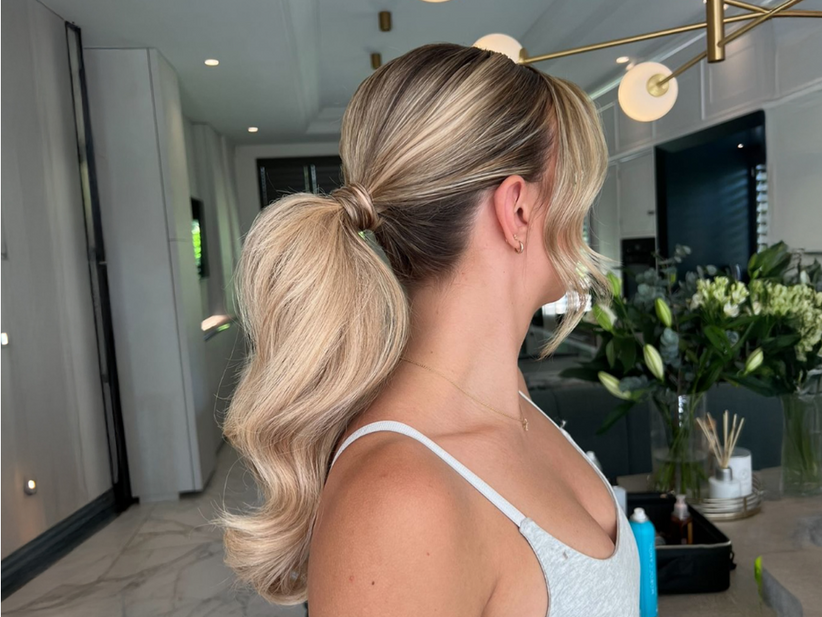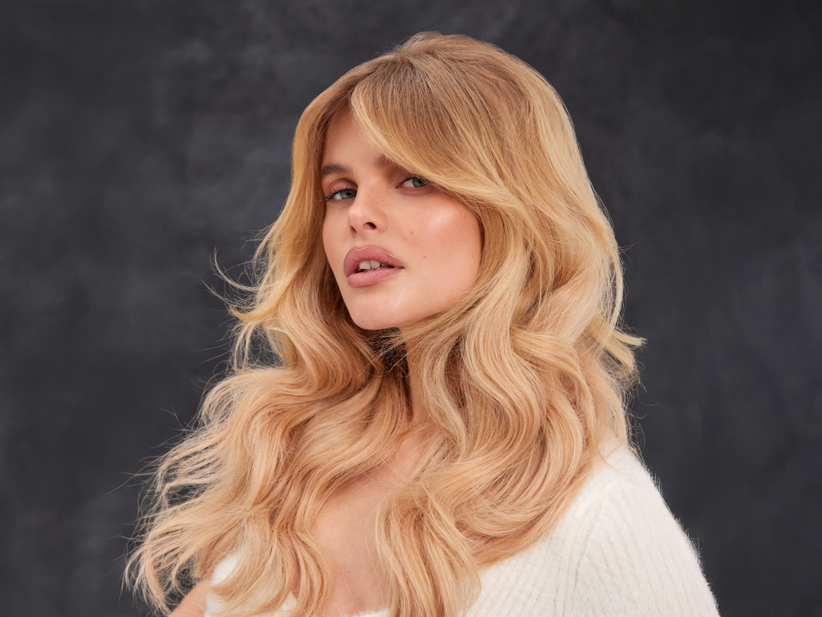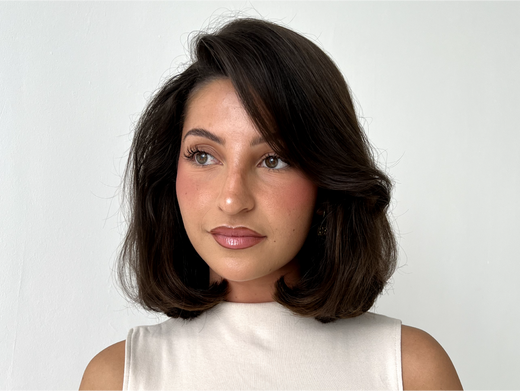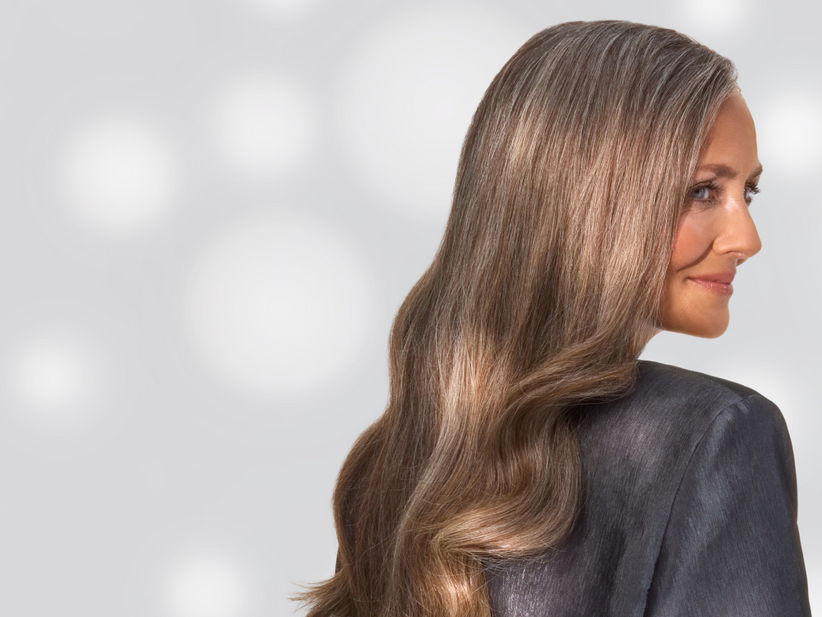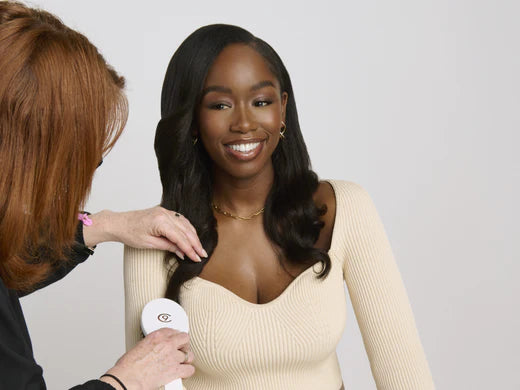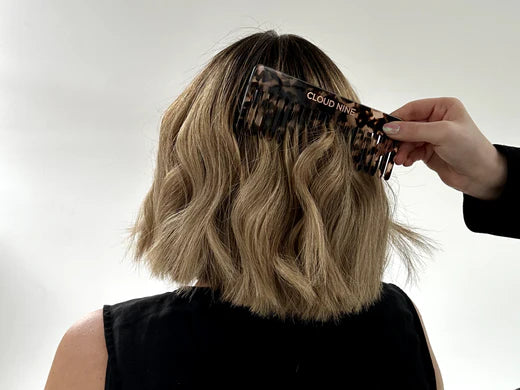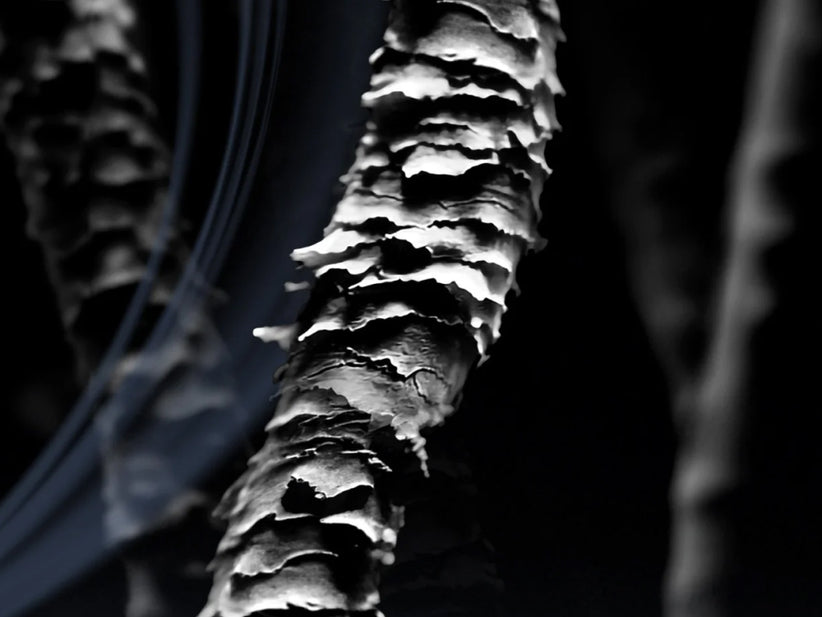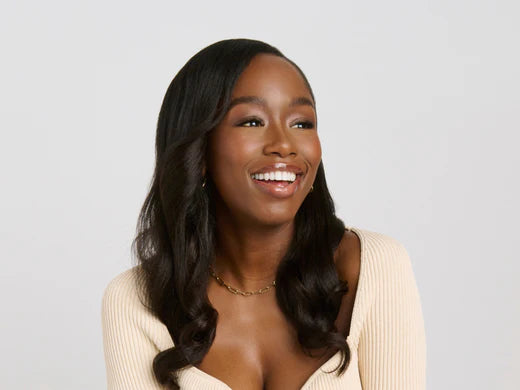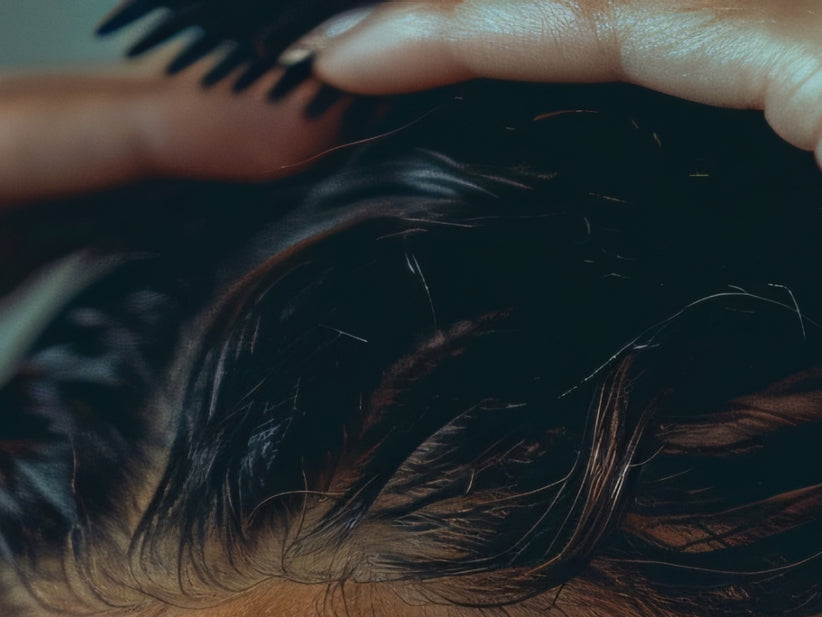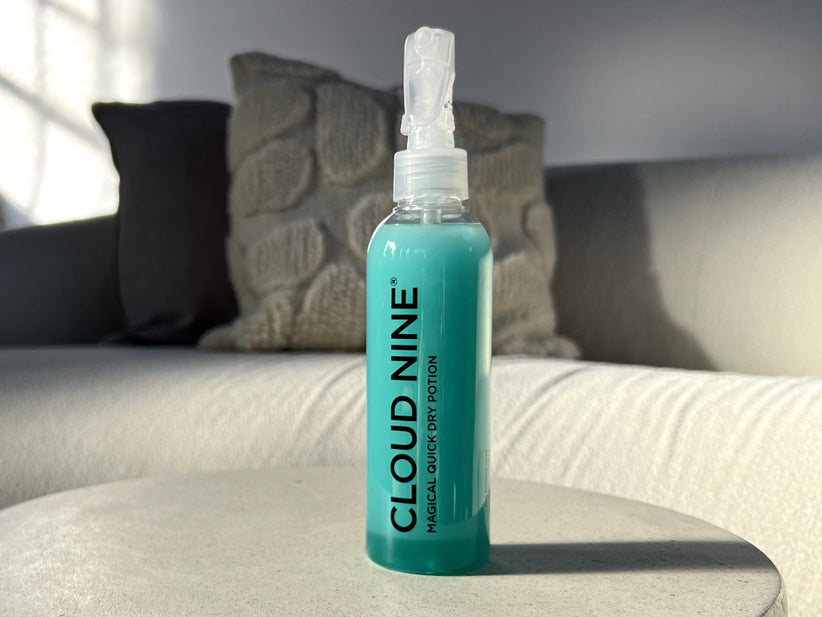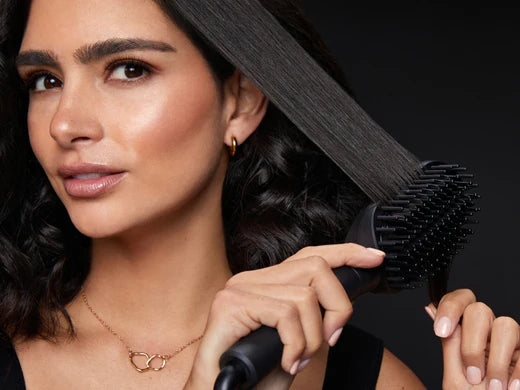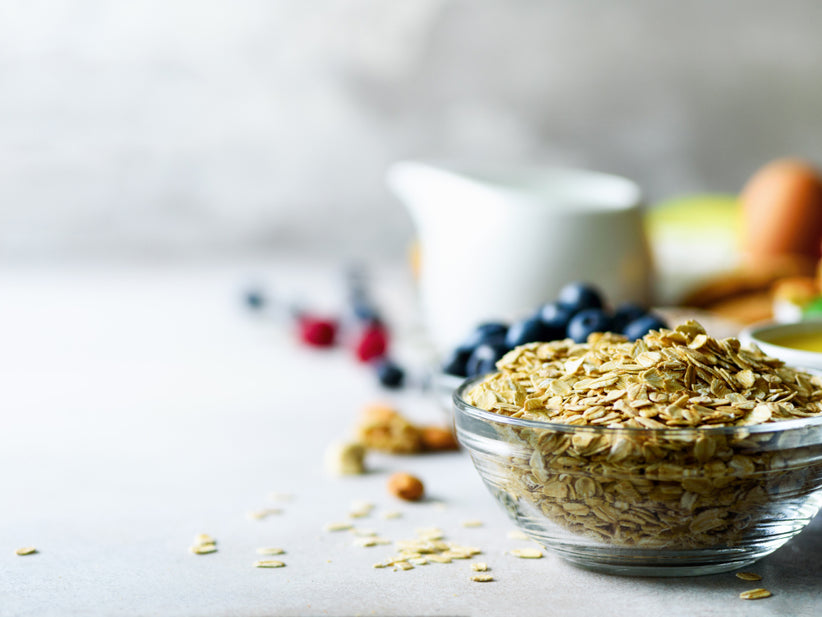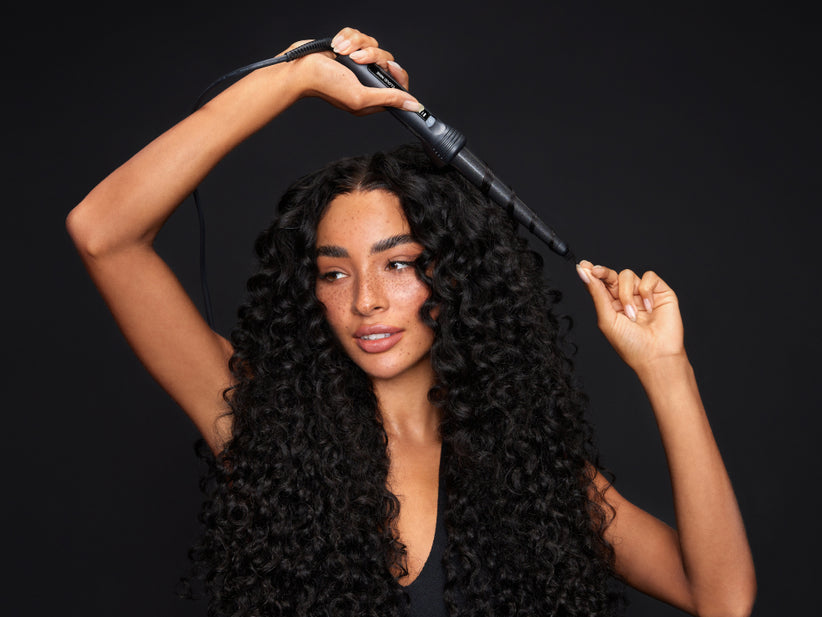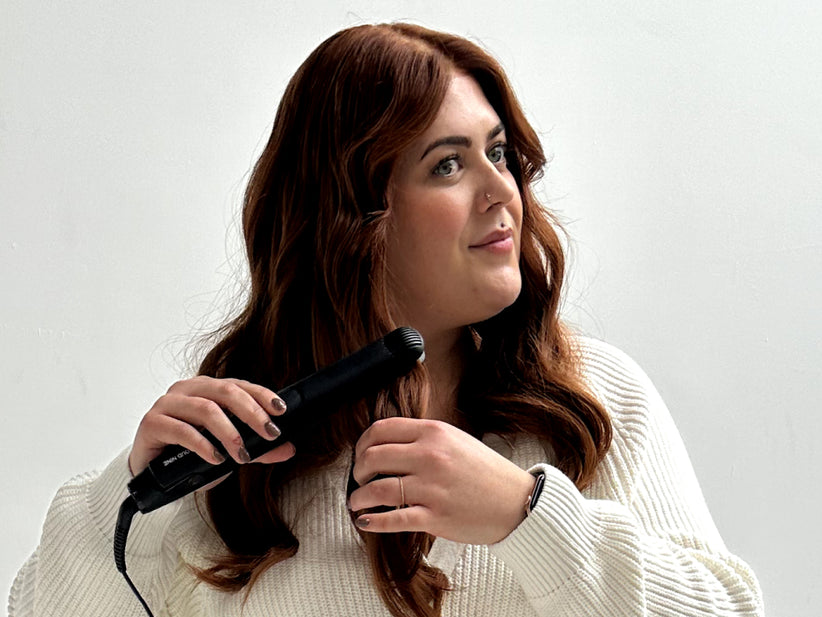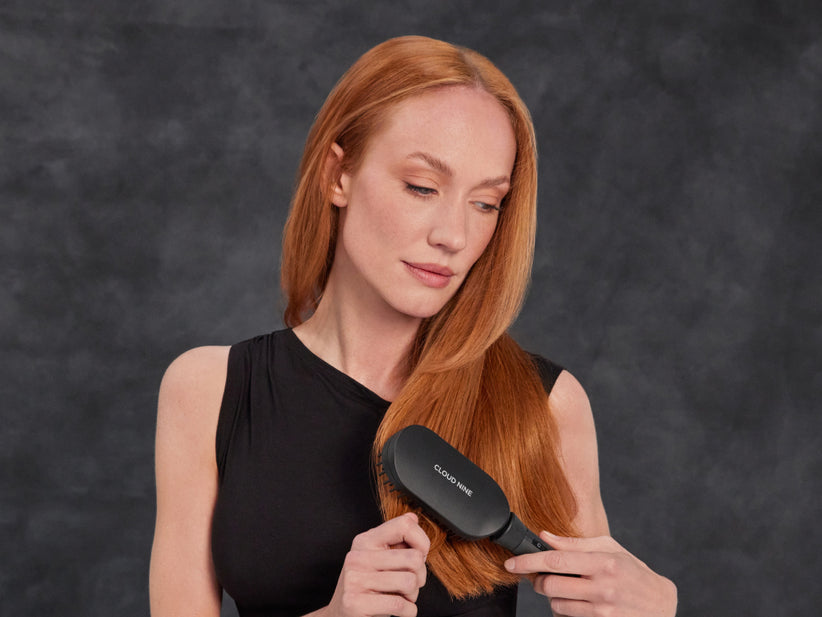Menopausal hair loss, while sometimes unavoidable, doesn’t have to be permanent. With some simple self-care, you can be on the road back to hair confidence in no time.
Combat some of the contributing factors with the help of CLOUD NINE’s tips, and you’ll soon be back on the road to feeling your most confident self.
YOUR HAIR IN MENOPAUSE: KEY TAKEAWAYS
- Menopause is a natural life stage with many symptoms – sometimes including changes to and loss of hair.
- As your hormone levels fluctuate during perimenopause, menopause and postmenopause, so does your hair’s growth cycle, condition, strength, look and feel.
- You may notice thinning, hair loss, slow regrowth, brittle hair, a dry or greasy scalp, and changes to your hair’s texture, volume, and even colour.
- Other factors can contribute to menopausal hair changes, including genetics, stress, diet, and lifestyle choices.
- There are many options to treat and alleviate hormonal hair loss – it’s important to find what works for you.
- Wherever you are on your menopausal hair journey, don’t give up. Be kind to your hair and take back your confidence.
WHAT IS MENOPAUSE?
Menopause is a natural and unavoidable stage of life for anyone with a uterus. It’s part of the ageing process and signals the end of your reproductive years. Menopause usually happens between the ages of 45 and 55 but can happen earlier in some cases – often due to medical reasons such as cancer treatment or genetic hormonal imbalances.
When your periods begin to become irregular – eventually stopping altogether – you’ll experience a fall in oestrogen production, which can produce some often uncomfortable symptoms, both for the mind and body.
This includes, but is not limited to:
- Mood swings
- Hot flushes
- Headaches and/or migraines
- Trouble sleeping
- Anxiety
- Increased facial hair growth
- Changes to the skin
- Aches and pains
- Night sweats
- Changes in sex drive
While changes to your hair’s texture, condition and thickness may pale in comparison to this long list of side effects, tackling hormonal hair loss can be one way to give you a much-needed mood and confidence boost during this challenging time.
UNDERSTANDING HORMONE CHANGES IN MENOPAUSE
Menopause isn’t just a one-off event, it’s a long journey along the hormone highway. There are three stages to be aware of:
Perimenopause
Perimenopause literally means ‘around menopause’ and refers to a stage of around 4-8 years in which hormonal fluctuations begin, triggering a range of symptoms. Perimenopause is also called the menopausal transition and is when periods start to become irregular.
“Perimenopause has been known to cause hair thinning and loss. This is due to the drop in oestrogen that slows down our hair’s growth phase. For some women, perimenopause can begin as early as our 30’s, but more often than not, it starts between the ages of 40 and 44.” – Marie Nieuwoudt, Group Education Manager at CLOUD NINE.
Menopause
After perimenopause comes menopause. This 7-14-year period marks the end of a woman’s period and a significant drop in hormones. Menopause usually occurs between the ages of 45 and 55, but it can happen earlier due to genetic or medical reasons.
Post-menopause
In post-menopause, a woman’s periods have stopped for longer than 12 consecutive months. However, symptoms of menopause can sometimes continue or evolve during this time as hormone levels stabilise. This can take approximately 4-5 years, during which time, you may still experience some noticeable changes to your mind, body, and hair.
“I have seen some of my clients’ hair grow thicker and more luxurious after the rollercoaster of menopause is over – usually 18 months to two years after menopause. For people who have always had naturally fine hair, this can be just as surprising as the typical thinning we see in menopause.” – Marie Nieuwoudt, Group Education Manager at CLOUD NINE.
Learn more about how hormone fluctuations can lead to hair shedding and thinning in our guide to hormonal hair loss.
Keen to get under the skin of the science a bit more? Read our guide to how hormones affect your hair.
HOW YOUR HAIR AND SCALP CHANGE DURING MENOPAUSE
It’s believed that hair changes in and around menopause are due to a combination of hormonal fluctuations, genetic factors, and the slowing down of cell production with age. You may notice:
Thinning and hair loss
Many women in their 40s and 50s experience hair thinning and increased hair fall. A study from 2022 of 200 women aged 50 to 65 found that the prevalence of female pattern hair loss was 52.2%.
This menopause-related thinning commonly occurs on the front, sides, and top of the head, and can look like a widening part, receding hairline, or general all-over thinning of the hair.
During perimenopause, oestrogen levels begin to fall, reducing to their lowest level when menopause arrives. This drop in oestrogen means hair is in its growth phase for a shorter amount of time, so may not grow as fast or as much as it used to. It also results in higher testosterone levels in the body, which can shrink the hair follicles, resulting in finer hairs being produced.
Hair shedding can also be linked with different seasons. Find out more in our guide to seasonal hair loss.
Dry, greasy and brittle hair
Oestrogen levels also impact the natural oils your scalp produces. This sebum is responsible for keeping your hair smooth and lustrous, so a reduction in production can result in changes to hair texture, moisture and appearance, leaving it dull, brittle and prone to breakage.
This doesn’t only affect the hair – skin can become dry and more easily irritated too, including that on the scalp, resulting in an increased chance of dandruff.
In contrast, some women experience greasy hair during menopause. This is a reaction to dehydration which sees the scalp produce excessive sebum to protect hair in its new, brittle state.
Changes in texture and volume
As a fall in oestrogen shortens the growth cycle of hair, many women experience excessive hair shedding during menopause, the effects of which are made more noticeable by the regrowth of progressively finer and shorter hairs.
Menopause may also speed up the natural greying process, as the blood vessels responsible for supplying hair roots with nutrients – including melanin – start to diminish. Grey hair usually feels more wiry and can result in a complete change in hair texture. Many women find that their previously straight or wavy hair now has more texture or even curl to it.
These volume and texture changes can also be enhanced by the changing shape and size of the follicle and increased or decreased sebum production.
OTHER FACTORS THAT CAN CONTRIBUTE TO MENOPAUSAL HAIR LOSS
Hair loss is not just about hormones. It can occur at any age and be due to a range of factors.
When it comes to menopause specifically, these factors can cross over, resulting in higher chances of hair loss or damage in some cases.
Genetics
Just like male pattern baldness, menopausal hair loss is determined by genetic factors as well as hormonal changes.
Stress
High stress levels are known to contribute to hormonal imbalances, worsening menopausal hair loss.
Poor diet
As hair is a non-essential tissue, it’s low down on your body’s priority list when it comes to receiving all the vitamins and nutrients it needs to thrive. If your diet is poor, your hair will be one of the first areas to suffer from reduced growth and condition. Read about how nutrition can impact hair loss.
Hairstyle choices
Tight or high-manipulation hairstyles and accessories that pull on the scalp can cause added stress to the roots, worsening hair fall and breakage. Heat styling your hair at a heat that’s too high for your hair can also further damage brittle and dry menopausal hair.
Mythbusting: Heat styling during menopause
Many online articles will tell you to ditch your straighteners, curlers and even hairdryer to protect your more fragile menopausal hair. That’s exactly what you don’t want to hear when you’re feeling less in control of your look.
The good news is, with tools that have Variable Temperature Control and Revive Mode™, you can turn down the heat to protect your hair, and still achieve your signature style. Try the CLOUD NINE 2-in-1 Contouring Iron Pro for protection while straightening or curling. Just don’t forget to spritz with Magical Potion first.
HOW TO TREAT MENOPAUSAL HAIR LOSS
Healthy and vibrant hair is a big mood booster – something you might need even more than usual during menopause.
While some menopausal hair loss can’t be prevented due to its hormonal and genetic causes, it can be treated and minimised in many cases.
Try the following methods to help your hair age as gracefully as the rest of you.
Nutrition and diet
As usual, when it comes to menopausal hair care, beauty starts from the inside.
Keeping a balanced and varied diet is your best defence against menopausal hair loss. As always, make sure you include plenty of whole grains, fruits and vegetables. The following nutrients are especially valuable for hair health:
- Proteins – The building blocks of hair, proteins such as keratin and collagen are essential for maintaining hair’s strength and condition during menopause. Aim to consume 55-60g of protein per day to help grow healthy new hair.
- Iron – 30% of the population is anaemic, meaning they don’t get enough iron in their diets. Iron is important as it helps to keep hair in its growth cycle for longer.
- Fatty acids – To maintain your intake of essential fatty acids, make sure to include foods like salmon, tuna, flax seeds and nuts in your diet.
Discover more about how to nourish your hair through nutrition.
Haircare products
So you’re taking care of your hair from the inside by enriching your diet with hair-healthy nutrients, but what about the outside?
There are plenty of haircare products on the market formulated to promote hair growth and strength.
For menopausal hair, we specifically recommend products that provide the following:
- Scalp exfoliation – Exfoliating the scalp helps to remove dead skin cells, balance oil production and promote blood flow, stimulating hair growth. Try a product that contains chemical exfoliants like salicylic once a week. Find out more about scalp care rituals.
- Scalp moisturisation – A healthy scalp grows healthy hair. Ward off dandruff and keep your scalp fresh with a nourishing lightweight scalp serum. Look for non-greasy formulas that won’t clog your follicles and contain moisturising and collagen-stimulating ingredients.
- Deep conditioning – As we’ve already revealed, reduced sebum protection can leave your hair lacking its usual lustre during menopause – or just as bad, overcompensating for dehydration by becoming oily. Prevent this with added moisture courtesy of hair masks and creams, such as CLOUD NINE’s Magical Remedy.
- Heat protection – If you regularly blow-dry, curl or straighten your hair, there’s no need to stop in menopause. Just be mindful of the temperature you’re using and offer your hair enhanced protection in its more fragile state with CLOUD NINE’s Magical Potion.
Medical intervention
If you’ve made dietary and haircare changes but you’re still concerned about your menopausal hair loss, it’s perfectly normal to consult a doctor – both to set your mind at ease that there are no other more serious underlying causes and to seek medical treatments.
One popular treatment is hormone replacement therapy (HRT), which restores the oestrogen depleted during menopause to relieve menopausal hair loss, including, in some cases, hair loss and thinning. If hair loss is your main menopausal concern, discuss HRT with your GP, as some therapies are hair-friendly, but others aren’t beneficial for this specific issue.
If you’re trying HRT, be patient. The effects on your hair could take a while to show. As hair grows just one centimetre a month on average, it may take four to six months to see a difference from HRT.
Over-the-counter treatments
You may not need to go to your doctor to find a solution that works for you. Many treatments for hormonal hair loss are now available over the counter.
One of the most popular, and proven options is an ingredient called minoxidil, which is incorporated into shampoos and hair lotions. These are applied to the scalp dry and stimulate hair growth by improving blood flow to the scalp and prolonging the growth phase.
Another option is ketoconazole shampoo, which can help to stimulate hair growth by lowering testosterone levels in the hair follicles.
Stress management
Stress can make hormonal imbalances way worse than they need to be. Combat it with some good old-fashioned self-care.
“Being kind to yourself during menopause goes beyond being kind to your hair. Consider alternative therapies such as yoga, aromatherapy and massages. Some people find that certain essential oils can help to support emotional well-being, increase energy levels and stabilise mood changes. Overall, it’s key to take time to understand how both your physical and mental well-being are changing” - Marie Nieuwoudt, Group Education Manager at CLOUD NINE.
Hydration
Water is the essence of life. We all know staying hydrated is the key to glowing and clear skin, but what about the hair?
Well, proper hydration can help to keep your hair supple and strong – something that’s especially important in menopause, when the hair is naturally more susceptible to breakage, split ends and brittleness.
Remember how important blood flow is for delivering those much-needed nutrients, vitamins and hormones to your roots? Well without adequate hydration, this process won’t be as efficient.
“Staying hydrated both internally – by drinking water - and externally - through the products that we use - is vital during perimenopause. We lose moisture much quicker, and the hair - as a non-essential tissue - is one of the first places to feel it.” - Marie Nieuwoudt, Group Education Manager at CLOUD NINE.
Exercise
Exercise may not be a proven treatment for menopause, but we don’t need scientific research to tell us that it makes us feel good!
As well as reducing stress and helping you to maintain a healthy weight, exercise is a key component to managing your mood and getting your blood flowing, keeping those hormones as balanced as possible.
Choose a form of exercise that you genuinely enjoy, whether that’s something gentle like yoga or swimming, or a challenge in the form of weight-lifting or long-distance running. Remember, it’s all about getting you moving and boosting your mood.
Supplements
Supplements should never be used as a replacement for a balanced diet, but alongside one, they can help to maintain your hair’s condition and appearance throughout menopause.
Many of the nutrients we’ve already mentioned can be found in supplement form both online and in your local health food store, including iron and collagen. Our Hair Educator, Marie, recommends a few more:
“The nutrients that our bodies need to stay healthy alter as we get older. During perimenopause, it’s the vitamins and minerals that regulate our hormones that become incredibly important. Omega 3, Evening Primrose Oil and Magnesium, in addition to vitamins B, D and K can help to support overall well-being.” Marie Nieuwoudt, Group Education Manager at CLOUD NINE.
Keep your stylist close
Finding a hairdresser that you trust is a life milestone. When it comes to adapting to your menopausal hair, that trusted stylist becomes your most valuable ally.
A life-long hairdresser is a life-long friend – they know your hair inside out and have probably seen it at its best and worst, so will be able to spot the effects of hormonal changes before you do. Plus, they’ll have the tips to get your hair through menopause with minimal damage.
“Scheduling a regular haircut is essential to monitor and maintain healthy hair. Don’t be afraid to tap into the expertise of your stylist. Ask them for advice on how to navigate your hair type and texture as it changes. Whether it’s simply a product recommendation, or pointing you towards a medical hair loss professional, your stylist’s professional expertise and long-term relationship with you puts them in the ideal position to advise on menopausal hair care.” - Marie Nieuwoudt, Group Education Manager at CLOUD NINE.
BE KIND TO YOUR HAIR, BE KIND TO YOURSELF.
When it comes to menopause haircare, there are no hard and fast rules.
Everyone’s hair, mind, and body responds differently to the hormonal changes characteristic of this life stage – so it’s important to listen and respond to your unique needs.
The changes to our hair, skin and nails experienced throughout perimenopause, menopause and postmenopause can have a devastating effect on self-esteem and ultimately become a confidence killer. Many women say that their hair becomes a stranger to them during this time. The products, tools, and skills you once used may not seem to work the same as they used to and you have to adapt. That’s why it’s so important to try a bit of gentle trial and error with new techniques to achieve the results you’re looking for on your new hair, skin and nails.
If you follow one guideline alone, make it this: Be kind to your hair.
“As a hairdresser, I see the resulting stress of rough treatment on hair all the time. Just remember that your hair is riding the hormone highway with you – it deserves all the care and kindness you do as you weather the journey that is ageing. This might mean evolving your routine with its new and developing needs, such as turning down the heat, switching up your products, and seeing your hairdresser more often. I always recommend CLOUD NINE products, not only for their fantastic quality but because they’re genuinely better for your hair health. With Variable Temperature Control and cutting-edge Revive Mode™ technology, you get gorgeous results without the heat damage, giving you the confidence to feel unstoppable.” - Marie Nieuwoudt, Group Education Manager at CLOUD NINE.
MENOPAUSAL HAIR LOSS: FAQS
Still not sure what you should and shouldn’t do with your hair during menopause? Check out our FAQs.
Can hair loss during menopause be reversed?
For many women, the excessive hair shedding experienced during perimenopause is a temporary phase, not permanent balding. Once your hormones settle back down, your hair growth rate may return to normal. However, changes to the texture and even colour of hair due to hormonal changes can be permanent.
Treating your hair kindly using the tips in this blog as a guide is a good way to bring your hair out of menopause in the best possible condition.
Is HRT good for hair loss?
HRT, or hormone replacement therapy can be a good solution for hormonal hair loss. Not all hair loss is caused by hormones, like that experienced during menopause, so it’s important to consult with your doctor and rule out any other possible causes before pursuing this treatment.
Can I use heat on my hair during menopause?
Much of the narrative around menopausal hair tells women to stop heat styling, which is exactly what you don’t want to hear when your appearance is changing and your confidence is suffering.
To maintain your usual heat styling routine without compromising your extra delicate menopausal hair, turn down the heat on your styling tools, use tools with CLOUD NINE’s Revive Mode™, such as the Wide Iron Pro, and prep your hair with plenty of Magical Potion before styling.
Check which heat setting is perfect for your menopausal hair by using our Temperature Calculator.
Which vitamins can help with hair loss during menopause?
Your hair can benefit from a range of vitamins, minerals and nutrients throughout your life, but the following are particularly beneficial during menopause:
- Biotin – Helps with the production of keratin, an essential component of hair that provides strength and structure.
- Iron – Helps your body carry oxygen to your cells, including your hair cells, helping to keep them in their growth phase for longer.
- Vitamin D – Helps hair follicles grow and function properly.
- Vitamin C – An essential component in collagen, one of the hair’s vital proteins which is responsible for keeping the hair shiny and strong.
- Zinc – Aids in the division and reproduction of hair cells, promoting the growth of strong new strands of hair.
- Omega-3 fatty acids – Support circulation and help to maintain a healthy hair growth cycle.
At what point should I be concerned about hair loss?
Everyone experiences different levels of hormonal hair loss during menopause – what’s normal for you may be abnormal for someone else. If your hair loss is bothering you, don’t hesitate to book an appointment with your GP to discuss it. They will be able to rule out any other causes, set your mind at ease and suggest a treatment that works for you.


.jpg?v=1724142040589)


.jpg?v=1724140515432)
